The Trump Administration’s Economic War Against Venezuela Will Not Succeed
The Trump Administration has effectively declared economic warfare against the government of Nicolas Maduro. It won't succeed, and will further victimize the already suffering Venezuelan people.
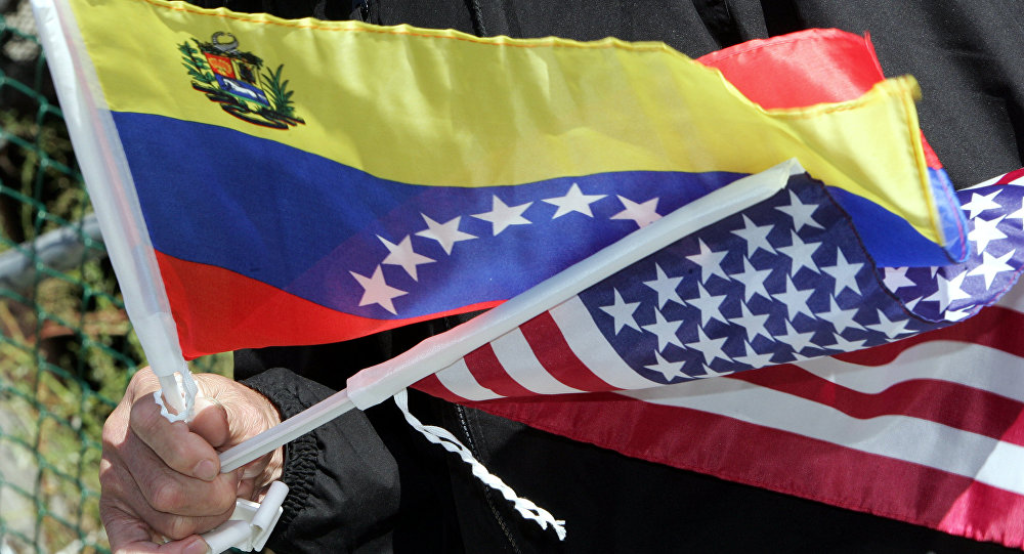
In the Trump Administration’s continued campaign against the government of Nicolas Maduro, the President announced a new round of sanctions against Venezuela that will likely only increase the suffering of the Venezuelan people:
WASHINGTON — President Trump signed an executive order on Monday imposing new economic sanctions on the government of Venezuela, escalating his campaign to remove President Nicolás Maduro from office.
The White House announced the action, which freezes the property and assets of the Venezuelan government and those of any individuals who assist Venezuelan officials affected by the order, on the eve of an international conference on Venezuela in Lima, Peru. Several Trump officials, including the national security adviser, John R. Bolton, and Commerce Secretary Wilbur Ross, are scheduled to attend the gathering, which will discuss ways to “restore democracy” to Venezuela, according to Peru’s government.
Mr. Trump’s order cited “the continued usurpation of power” by Mr. Maduro as well as “human rights abuses, including arbitrary or unlawful arrest and detention of Venezuelan citizens, interference with freedom of expression, including for members of the media, and ongoing attempts to undermine Interim President Juan Guaidó and the Venezuelan National Assembly’s exercise of legitimate authority in Venezuela.”
The Trump administration has thrown its support behind Mr. Guaidó, who has called Mr. Maduro an illegitimate leader. In April, the Trump administration supported his calls for generals to rise up against the socialist president, but Mr. Maduro retained the support of the military and squelched the immediate threat to his power. Using Mr. Trump as a foil, he has cast himself as a brave survivor against American imperial influence.
The effects of the sanctions were not immediately clear. Several sanctions experts on Monday night questioned initial news media reports that characterized the action as a total “embargo” on Venezuela. Given that Mr. Trump has repeatedly placed sanctions on Mr. Maduro’s government since taking office, some predicted a modest economic effect.
“This appears to be more light than heat,” said Richard Nephew, a former State Department official who has written a book on economic sanctions and is a scholar at Columbia. “This is not an embargo. It does not create penalties for business with Venezuela altogether, it just denies such activities with the government of Venezuela, and it is doubtful there were any of those still extant to be cut off by this action.”
Others predicted more severe consequences.
While the sanctions prohibit doing business only with the Venezuelan state, they could harm the country’s surviving private firms, which already struggle to find suppliers and make payments abroad, said Francisco Rodríguez, chief economist of the New York-based brokerage Torino Capital and former economic adviser to a Venezuelan opposition presidential candidate.
“Financial institutions will be cautious not to make dealings with Venezuelan private sector firms, which could be perceived as proxies for the Venezuelan government,” he said.
Fernando Cutz, who oversaw South America policy at the White House under Lt. Gen. H.R. McMaster, the former national security adviser, said the new order, at a minimum, “puts Venezuela on a list of really horrendous regimes out there.”
The test, Mr. Cutz said on Monday night, is whether the new sanctions prevent Russia and China from receiving Venezuelan oil as part of a debt repayment program. If so, he said, “that’s a pretty significant thing, and then the question is how Russia and China will respond, more than anything else.”
He said that Russia was close to being paid in full for its debt relief to Venezuela, but that China was on pace to be receiving oil from the South American country until early 2021. “They might stand to lose more,” said Mr. Cutz, who is now at the Wilson Center, a think tank in Washington.
Venezuela’s imports per capita have already fallen to the lowest level since the 1950s. The country’s imports totaled just $303 million in April, down 92 percent from the same month in 2012, according to Torino Capital.Venezuela’s economy was already forecast to decline 35 percent this year, according to the International Monetary Fund. By the end of this year, the country’s gross domestic product will have shrunk by two-thirds since 2013, making it the largest economic collapse in a country outside of war since at least the 1970s.
The sanctions could also strain the lackluster political negotiations between Mr. Maduro and the country’s opposition, now based in Barbados and Norway, which many political analysts see as a final chance for a peaceful political transition in the country. Mr. Maduro’s negotiators have offered the opposition a prospect of presidential elections in return for the lifting of American sanctions — a possibility made more distant by the Trump administration’s action.
As The Guardian notes, the impact of these sanctions seems rather easy to predict:
experts questioned the impact and wisdom of the measures, which Maduro’s administration and its Russian backers branded “economic terrorism”.
Some fear the latest sanctions will further aggravate an already dire humanitarian situation which has already forced millions to flee Venezuela, while others believe they will alienate Guaidó’s European backers who believe a negotiated solution is possible.
Christopher Sabatini, a senior fellow for Latin America at the Chatham House thinktank, said Trump’s latest gambit was designed to achieve nothing but Maduro’s immediate downfall.
“This is intended to bring this government to its knees and to bring in Guaidó. That’s it … But it will not work. It will actually make Maduro’s government what it always wanted to be: a martyr,” Sabatini said.
Farid Kahhat, a professor of international relations at Lima’s Catholic University, said that while Maduro was to blame for Venezuela’s economic meltdown, “what the US is doing is making things worse – at least in the near future”.
(…)
David Smilde, a Venezuela expert from the Washington Office on Latin America advocacy group, said for all Bolton’s “soaring, inspirational rhetoric”, the new sanctions were unlikely to prove a game-changer.
“He’s been saying the same thing for a long time.”Eric Farnsworth, a former US diplomat and vice-president of the Council of the Americas, said the US moves were partly an attempt to signal that efforts to unseat Venezuela’s strongman leader had not “plateaued”, as well as to further undermine Maduro.
“Obviously the goal here is to get Maduro out of power … [But] I don’t now what the trigger is to force him out – I don’t think anybody does. That’s part of the issue,” he admitted.
Daniel Larison calls the new sanctions ‘despicable’:
This is the “blockade” that Trump hinted at last week. It is a drastic escalation of the economic war that the U.S. is already waging against the country, and it will do tremendous harm to the civilian population. Economic embargoes are very effective in depriving ordinary people of necessities and cutting them off from the outside world. As the Cuba embargo has proven, they do not lead to the overthrow or weakening of the government. On the contrary, the more isolated and cut off from the rest of the world a country becomes the more power that gives a government and its cronies.
Trump’s despicable embargo is not the military blockade that he seemed to be suggesting last week, but it is no less destructive and horrible in its effects. By doing this, the president is dooming countless innocent people in Venezuela to die from hunger and preventable disease. The U.S. government is deliberately employing starvation as a weapon to pursue regime change in a neighboring country. There are few more reprehensible and unjust actions that our government can take against another country.
Summing all this up, National Security Adviser John Bolton, who is known to be pressing the Trump for tougher action against the Maduro regime, is sending a stark warning:
An international summit meeting on Tuesday that was meant to break the political stalemate in Venezuela became a one-sided showcase for the United States’ toughest sanctions yet on President Nicolás Maduro’s authoritarian regime.
During the conference of more than 50 countries in Lima, Peru, the Trump administration rejected compromises proposed by international mediators and some Latin American nations as it doubled down on its so-called maximum pressure policy to oust Mr. Maduro.
Mr. Maduro’s government wasn’t invited, prompting his allies — Cuba, China, Russia and Turkey — to decline the invitation to the meeting.
“We take this step to deny Maduro access to the global financial system and to further isolate him internationally,” John R. Bolton, the administration’s national security adviser, said in Lima, outlining a freeze on Venezuelan state assets in the United States. “We want to send a message to third parties wanting to do business with the Maduro regime: There’s no need to risk your business interests in the U.S. for the purposes of profiting from a corrupt and dying government.”
(…)
In Lima, Mr. Bolton mentioned Cuba nine times in 12 minutes, saying that extreme economic pressure will “work in Venezuela and it will work in Cuba.” The United States has banned most trade with Cuba since 1962, without toppling its government.
But the message seemed aimed at American voters, particularly in Florida, said Geoff Ramsey, head of the Venezuela program at the Washington Office on Latin America. Florida has a large Cuban-American population and is crucial to Mr. Trump’s re-election prospects.
“Talk of economic embargoes may play well among the Cuban community in Florida, but people in Venezuela will be asking themselves if they will have to live through this for the next 60 years,” said Mr. Ramsey.
He added: “This is a policy built on Cold War rhetoric.”
The most amusing part of Bolton’s comments of course, ae the highlighted portion where he cites the embargo against Cuba as the model for our policy in Venezuela. If anything, that embargo should stand as proof that what we are trying to do here is doomed to failure. That embargo was imposed in the first year of the Kennedy Administration and enforced by each of the eight Presidents that followed until President Obama took some steps to change that, a policy that the Trump Administration has tried to reverse. Fifty-eight years later, the regime established by Fidel Castro remains in power and the embargo has only helped make the Cuban people poorer. If that’s the future we have in mind for Venezuela then the outcome would seem to be rather obvious.
These aren’t the first sanctions that have been imposed on Venezuela by the United States and other countries, of course. The extent of those sanctions has been so wide-ranging in recent years that the Venezuelan economy, which ought to be among the strongest in all of Latin America, is instead a total disaster. Granted, not all of that can be attributed to the sanctions that the Obama and Trump Administrations have imposed. The socialist economic policies of Maduro and Hugo Chavez before him did a fine job all on their own of wrecking what could have been, thanks to its oil reserves. At the same time, though the United States has not helped the situation with its sanctions policy and it certainly hasn’t done anything that would actually improve the lot of the Venezuelan people, who have already suffered quite enough for the past decade.
The aim of these sanctions is, of course, quite clear. They are intended to continue to choke the Venezuelan economy to the point where the Maduro government either voluntarily gives up power or the military does what it has attempted and failed to do several times in the last few years, overthrow the Maduro government. In the meantime, the Venezuelan people continue to be pawns in a game between Washington and Caracas. Perhaps this will all lead to the end of the hell that Chavez and Maduro have inflicted on their people, but in the meantime, the Venezuelan people continue to suffer as their country heads closer and closer to a famine that would be otherwise completely avoidable but for the sanctions that this Administration continues to impose. (Larison discusses that plunge toward famine here and here, and Venezuelan economist Francisco Rodriguez discussed the issue in a New York Times Op-Ed.) That makes us morally responsible for what happens to these people, and that’s what makes the sanctions reprehensible.
In another post, Larison adds this:
The Trump administration is obviously not concerned about the harm that their sanctions policy has been doing to the people in Venezuela, and they will keep chasing their goal of regime change regardless of how many people are hurt or killed in the process. When sanctions were imposed on Venezuela’s oil sector six months ago, critics of the move warned that the sanctions would exacerbate the humanitarian crisis without dislodging Maduro. Starving people to force a change in government is the wrong thing to do in any case, but we can see that it has also been ineffective in bringing about the regime change that hawks want. We have been pointing out the damage caused by sanctions for all this time, and the Trump administration’s only response to evidence of the ongoing failure of their policy is to intensify the economic warfare that is suffocating the population.
As Larison goes on to note, the Trump Administration is effectively trying to bring about regime change in Venezuela by engaging in what amounts to an economic war against its government. What the Administration either fails to note or simply doesn’t care about, is that “you cannot wage an economic war against a country’s government without waging that war against all of the people in the country.” The people who suffer the most in that kind of war aren’t the leaders, they are the people in the streets, the people that Trump and Bolton claim to be helping with this policy. In fact, what they’re doing is inflicting more pain with no prospect that it will actually accomplish anything.

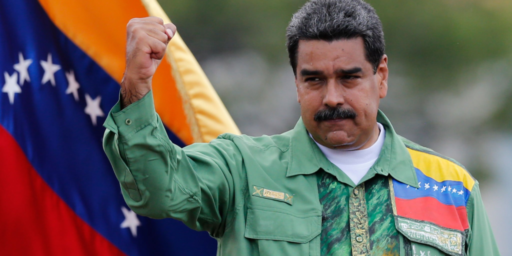
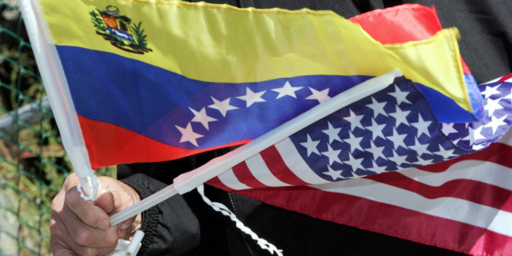
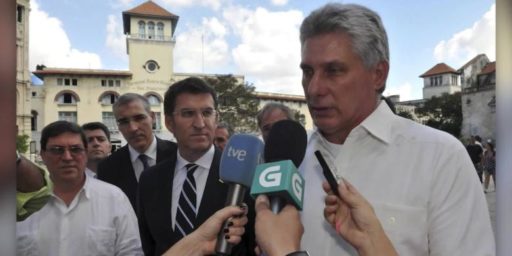
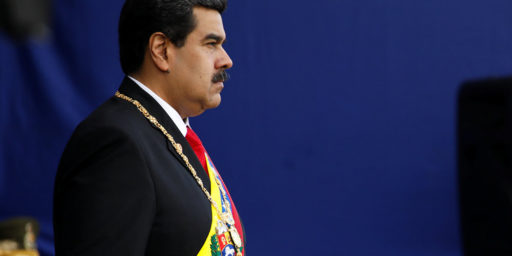
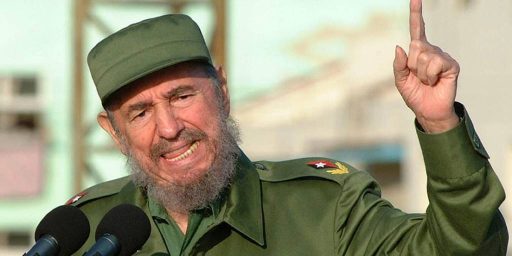
You’d think when you’re nearing on the sixth decade of a failed strategy, you’d at least look at other options rather than doubling down on it.
Isn’t making the little people suffer the whole point of Tony’s policies? It certainly the core of his domestic policy.
@Kathy: Yeah, it’s worked SO WELL with Cuba. Just a few decades more and conservatives are SURE it will get rid of the Castros.
It’s awesome embargoes and sanctions worked so well in apartheid South Africa. Unfortunately that seems to be the exception, not the rule, but it seems to be human nature to not recognize a sunk cost and lost cause very well.
@Just Another Ex-Republican:
They’d best hurry, don’t you think? Otherwise death will take care of the remaining Castro first.
About South Africa, they were a democracy of sorts, even if only for the white minority, with an inherited legal Anglo legal tradition of sorts, and even then it took several decades of sustained effort. Not to mention many other countries were involved in said effort.
El Cheeto won’t bend Maduro to his will in a few years, even if economic sanctions work. Besides, Venezuela is in so bad a shape, even lifting sanction won’t fix it. They’ll require time, effort, and lots of foreign aid and investment.
Also Venezuela is in such a state of corruption and chaos that it’s hard to see how to fix it. I really really hate it when Venezuela gets yanked out as an exemplar of a “socialist economy.” Venezuela’s problems are caused by 90% corruption, 1% socialism, and 9% silly antics like what Trump is up to. Not that Maduro (or whoever is in charge at present) isn’t totally willing to use Trump’s bluster to scream bloody murder about How All Our Problems Are The Nasty U.S. If Trump were really interested in helping actual Venezuelan people he wouldn’t do the political equivalent of loading the bazooka and handing it over to the other side, pointed at us.
And when the inevitable refugees flee the US inflicted starvation, trump will open the Southern border and say, “C’mon in! We’ll be happy to help!”
@grumpy realist: people responding to Democratic policy suggestions with “Whatabout Venezuela?” are doing you a favor. They’re alerting you to the fact that they’re really dumb and you don’t have to waste time on them.
“It won’t succeed, and will further victimize the already suffering Venezuelan people.”
Of course, that could depend on what the goals are. If, for example the goals are
Placating Bolton’s urge to be an anti-Castro tough guy,
Making sure that Venezuela stays a “sh!thole country,”
Showing prospective allies across Latin America that America isn’t really an ally,
Potentially complicating upcoming trade negotiations with China
Doing some sort of a deke move to show “see? I’m not in Putin’s pocket at all,”
Showing the drooling masses of MAGAots that he’s the kind of tough guy they need to keep us “safe,”
Heaping more misery of brown people,
or other such outcomes, it possible that he’s succeeding just fine. MAWA!
@grumpy realist: “it’s hard to see how to fix it.”
True dat! The suggestion I can make is to take a phrase from the Hippocratic Oath
That might be a start, at least.
Inflicting pain is what Trump does. It’s the essence of his personality.
If Trump cannot express goals for his policies that are coherent, how do we really know if these policies are successful? We don’t know what the voices in his head are telling him.